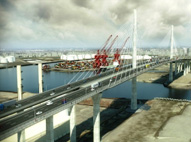FCC Wins the €540-Million Contract for Gerald Desmond Bridge in Los Angeles, USA
The Citizen Services Group will be building the bridge in a consortium with the Italian company Impregilo and local group Shimmick.

"The United States is a target market for FCC." These words, pronounced by the Citizen Services Group's chairman and CEO in late March during a visit to New York, are starting to take the form of contracts in hand. The California Department of Transportation chose to give FCC the design/build contract for the replacement of the obsolete Gerald Desmond Bridge in the Port of Long Beach, Los Angeles.
The contract has a budget of 650 million dollars (around 540 million euros). The full project will take five years to complete and was awarded to a joint venture in which FCC will be working alongside local group Shimmick Construction Company Inc (40%) and the Italian company Impregilo S.p.A. (30%). The Port of Long Beach authorities have described the winning bid as "world class".
The historic Gerald Desmond Bridge was built in the 1960s. Proof of its importance is the fact that it currently carries more than 15% of the waterborne cargo traffic of the United States. The bridge connects the heart of the Terminal Island port complex with the Port of Long Beach, and it provides the way to get from the port to the centre of the city and other nearby California locations.
The road across the bridge is designed as a connecting road within the National Highway System and forms part of the Federal Strategic Highway Network. The new bridge will improve traffic flow, increase safety, provide jobs for more than 3,000 people a year and have a highly positive impact on the economy of southern California, and therefore on the economy of the United States.
The new bridge will be cable stayed, 305 metres long, with 61 metres of vertical clearance above the Back Channel of the Port of Long Beach. The bridge will have three motor vehicle lanes in each direction, emergency lanes on both sides for additional safety, a bike lane and a pedestrian lane.
West of the bridge, the horseshoe-shaped Terminal Island East interchange connects Ocean Boulevard with the port's Pier T. To the east, the interchange linking Ocean Boulevard with Route 710, Pico Avenue and piers E and D will be remodelled. Construction of the new bridge is scheduled to be completed in 2016, one year before the conclusion of the project as a whole.
Experience Building Bridges
Over the last 15 years, FCC has built more than a million square metres of bridges. That includes bridges of every kind, employing every construction system currently in use. FCC's cable-stayed bridges include El Alamillo Bridge in Seville, a bridge in Saxony, Otopeni Bridge in Bucharest, Azud del Oro Bridge in Valencia and Basarab Viaduct in Romania.
Right now FCC is involved in the construction of other major bridges, such as Vidin-Calafat Bridge between Bulgaria and Romania, San Marcos Viaduct (the second-tallest viaduct in the world) in Mexico, the bridge over the Lauterbach Valley in Germany, the new access bridge to the Centennial Bridge in Panama and Kafjord Bridge in Norway.
FCC in the US
The Citizen Services Group is currently participating in 9,000 million dollars' (about 6,820 million euros') worth of government tenders all over the United States. And it is doing this through its different business areas, infrastructure, services and energy.
FCC Construcción handled the I-95 Miami Express project, which had a budget of 121.5 million dollars and involved increasing the number of lanes over a 17.7-kilometre stretch of I-95 in northern Miami. The project won two awards, Best in Construction 2010 in the Design and Construction category from the Florida Transportation Builders' Association (FTBA) and the one of the America's Transportation Awards 2009 from AASHTO in the Innovative Management category.
The group's environment subsidiary, FCC Environmental, holds second place on the list of the biggest companies in its sector in the US. It is the leading provider of hydrocarbon services on the east coast and the Gulf coast and has over 30 facilities in 22 states. It recently launched a new initiative, a novel mobile treatment service for oil and gas prospecting operations. Among other important jobs, FCC Environmental participated in the work to clean up the Gulf of Mexico after last year's oil spill.
FCC's options in the US market are not just limited to infrastructure and concessions, Cemusa, the FCC subsidiary that specializes in urban furniture, provides coverage for over 12 million people in the cities of Boston and New York. In September 2010 it installed the world's first digital newsstands in New York City's Times Square, under a 20-year contract clinched with the City of New York in 2006.








